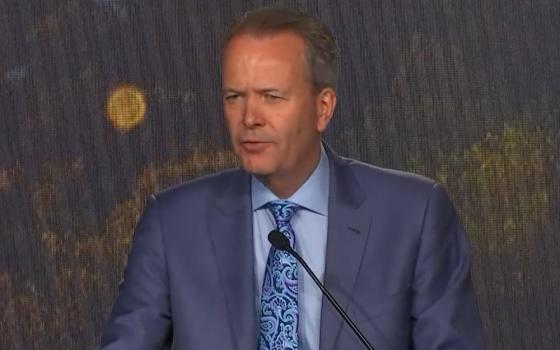The Pulitzer Prizes were announced today, just weeks after the movie version of the Boston Globe's prize-winning religion coverage won an Oscar and its highly touted experiment in full-blown Catholic reporting folded. That trial balloon, called Crux, was an enterprise edited by John L. Allen Jr., who left NCR to take it on. Four days after the Globe ended it, citing failure to attract enough ad revenue, Crux found a new home at the Knights of Columbus.
That outcome guarantees Crux's financial survival. The Knights run a huge insurance company that generates revenue for a host of Catholic causes and is a principal funder of Vatican projects. Its embrace of a highly regarded Catholic news site adds to the agency's stature and reach.
The question is what this does to Crux's identity. It was begun by a national secular newspaper that had admitted kowtowing too much to the Boston archdiocese before exposing the shocking priest sex scandal in a series that won a Pulitzer. Allen, chosen to be its editor, arrived as a high-profile Vatican reporter and author with great energy and competence though often from a perspective that clearly advocated Catholicism and its central hierarchy.
So it was a somewhat uneasy alliance to begin with, the Globe hoping to run with its Pulitzer and movie successes to spur readership and an editor understandably eager to broaden Catholic coverage with the resources of a major newspaper. The partnership lasted 18 months, praised by the Globe's higher-ups for its content, judged unviable by its revenues.
However unusual the journalistic arrangement, Crux at least could be held to its prevailing standards of objectivity and independence. Its very existence could be and was argued, but it was in place.
Now all that is up for grabs. Crux insists that its independence is assured. Perhaps it will, but it's difficult to imagine. The Knights have legitimately and powerfully advocated for and bankrolled every significant religious and ethical movement that the pope and the bishops have appealed for over the years, including opposition to abortion and artificial birth control, defense of an all-male priesthood and banning of same-sex marriage. Tens of millions go annually to such conservative campaigns, and of course they have every right to do so. When the organization takes on a publication declaring its independence, however, there is good reason to wonder whether Crux can remain neutral in reporting more than one side of these issues. Anything is possible, and Allen is an honest broker, but many of the Knights' priorities are likely his own, and he will no doubt be hard-pressed to maintain an open forum.
He need not, but the transfer from Globe to Knights calls for a clear definition of what Crux is now about. It cannot be the same under such different circumstances. It can be something else perfectly legitimately, but it cannot be what it claimed to be before. That would be unfair to Crux and to the Knights who steadfastly keep a mission of honorable advocacy. Whether it can or should tolerate dissent, which would mark it as a journalistic venture, is an open question.
One reason this is crucial is that religion reporting has had such a hard time establishing credibility in secular journalism. It has always been suspected of one kind of religious partisanship or another. The Religion Newswriters Association spent decades helping to improve that standing, though many controversies and struggles. The news media has often been callous toward religion, for reasons both sensible and not. Religion has often misrepresented itself, as the Globe's smashing series made clear, and didn't deserve the hype that sometimes made it seem far more influential than it actually was. There is blame on both sides, but progress has been made. The Globe-to-Knights shift raises those issues anew. Crux can be projected as a voice of Catholicism in whatever form it wants, and that's fine if that's its definition. But if it intends to be truly independent and adhere to the "neither fear or favor" script that underlies journalistic ideals, it can make that known, too.
In either case, it's unfair to readers to sound Pulitzer-like journalism and to religious publishing itself to blur the differences and pretend nothing has happened. If it's an awkward hybrid, unconventional but consistent partnership or yet another experiment, its profile needs sharpening.
[Ken Briggs reported on religion for Newsday and The New York Times, has contributed articles to many publications, written four books and is an instructor at Lafayette College, Easton, Pa.]




